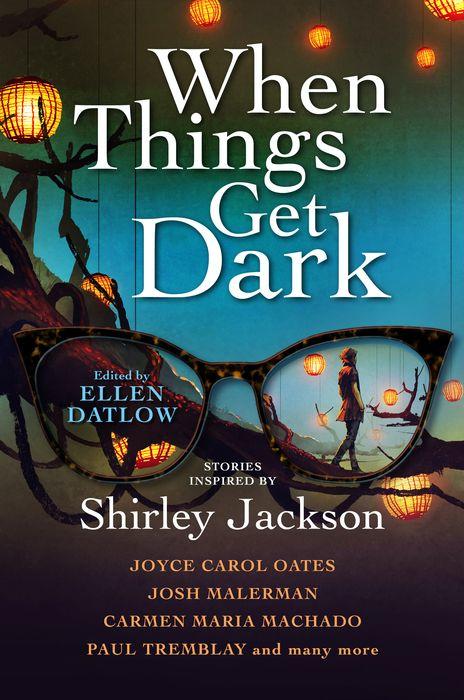When Things Get Dark / Edited by Ellen Datlow
 Titan Books / September 2021
Titan Books / September 2021
Reviewed by: Vince A. Liaguno
Crafting a tribute anthology to any established writer is a tall order, one fraught with the potential danger of cheap mimicry. When Things Get Dark, Ellen Datlow’s curation of new Shirley Jackson-inspired original tales, aspires to be more homage to Jackson’s themes versus an attempt to imitate her stylistic literary idiosyncrasies. The 18 stories endeavor to hit a sweet spot between reverential pastiche and modern thematic interpretations of Jackson’s rich catalog of work. Some of the stories in Datlow’s collection capture Jackson’s aesthetic, while others play with the eccentricities present in so much of her fiction.
At the heart of several of the stories Datlow presents in When Things Get Dark are middle-class women of a certain age whose well-established worldviews are particularly vulnerable to the fatalistic forces the contributing writers set upon them. All are women on the brink of some degree of madness. In “A Trip to Paris” by Richard Kadrey, for example, the story’s protagonist—longing for release from the claustrophobic chains of domesticity—has poisoned her family only to have their ghosts revisit her in a most inventive and visible way. Despite her increasingly desperate attempts to banish the ghosts that haunt her, they continue to resurface, thwarting her titular trip—an escape from the small, conservative town and its denizens she sees as her oppressors. Kadrey nails the Jackson influences here with gorgeous lines like:
“I was drowning, and when you’re drowning, you’ll do anything to keep from going under. You can’t blame a drowning victim for simply wanting to live.”
Likewise, M. Rickert’s “Funeral Birds” captures the essence of the quintessential Jackson heroine who is caged by the guilt and obsession over her own circumstances with Lenore, a lonely widow preparing to attend the funeral of a woman for whom she was a professional caregiver. Rickert beautifully depicts that Jackson-esque idea of the respectability of ordinary people juxtaposed against the ugliness of the secrets they hide.
In two of the anthology’s standout stories—Benjamin Percy’s “Hag” and Paul Tremblay’s “The Party”—their creators aim more for Jackson’s creepy aesthetic, permeating their tales with a palpable current of anxiety and paranoia. In the former, Percy presents a folkloric tale of a crime reporter—and her stowaway young daughter—investigating a series of murders and an island cult serving a voracious sea witch who demands sacrificial human victims. A foreboding island inn and spooky seagull totems add to the unnerving atmosphere. Tremblay’s “The Party” calls to mind Jackson’s 1958 novel, The Sundial, with its tale of a lesbian couple attending the younger spouse’s work party. An unsettling party theme, a mysterious, alien-like fruit, and strange partygoers are the vague ingredients Tremblay layers in before leaving the reader to fill in the gaps amidst an escalating sense of “something’s not right here…” They say the best stories leave you wanting more—and Tremblay accomplishes this masterfully.
The three best offerings in When Things Get Dark are more Jackson-adjacent than obvious homage. Genevieve Valentine takes Jackson’s recurrent theme of smart women who find themselves in ill-fated situations they can’t escape and crafts a deceptively simple story in “Sooner or Later, Your Wife Will Drive Home.” Structured as a series of seemingly unrelated vignettes, Valentine explores Jackson’s recurrent theme of women doomed by the promise of independence (in this case, driving automobiles) and reinforces the historical prevalence of violence against women in the #MeToo era. Likewise, Laird Barron shows how the worst predators often walk among us in “Tiptoe.” This subtle story involving a childhood game, photography, and the relationships between fathers and sons is beautifully layered and builds—almost unobservantly to the reader—to a wallop of an ending that still haunts me. Barron’s “Tiptoe” is a masterclass on how to artfully build tension, employing striking lines like:
“Trouble is, old, weathered pictures are ambiguous. You can’t always tell what’s hiding behind the patina. Nothing, or the worst thing imaginable.”
Finally, Kelly Link’s closer, “Skinder’s Veil,” is a triumph of magical realism. The story follows a disheartened grad student who’s having difficulty writing his dissertation—hampered by his own procrastination and an annoying roommate. When he receives an unexpected call from an ex-girlfriend begging him to temporarily assume her sweet housesitting gig in rural Vermont, he sees an opportunity to get away from the roommate and finish his thesis. That’s the set-up; to reveal any more of the plot points would be a disservice to the trippy adventure Link has in store for the reader. Suffice to say that “Skinder’s Veil” is as original as anything you’re likely to read this year.
As in any anthology, there will be stories that stand out, stories that fade quickly from memory, and stories that fail to connect; fortunately, Datlow delivers quite a few standouts here and only one or two that seem out of place. When Things Get Dark encapsulates much of the Shirley Jackson thematic universe—fatalism, fear of abandonment, women on the brink of madness, the duality of architectural symbols. Datlow has assembled a reliable cadre of contributors to carry out the daunting task of blending the Jackson aesthetic with their own distinct styles. The result is an often unsettling collection of top-notch tales that explore the darkest corners of the mundane, teasing out the anxiety, terror, and neurosis from the ordinary that Jackson was a master at conveying in her work.
Purchase When Things Gets Dark, edited by Ellen Datlow, here.



